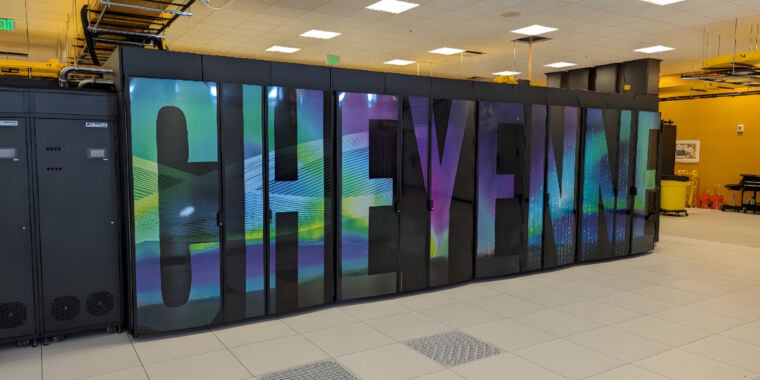Winner looking at his electricity bill:

Hey, I have worked on this exact machine before, neat to see they are finally decommissioning it. It would be a terrible purchase to actually use these days though, for the cost of moving and deploying it you could rock a few Hopper or Grace clusters that would outperform the cluster for less than half of the operating overhead.
I fully expect it to get parted out, the actual components would be far more useful on their own as cheap homelab systems, and would be a much better ROI versus using it as is. This thing is water cooled, just the plumbing would be a nightmare to deal with if you aren’t set up for it, and if you are you would be better off going with a modern architecture anyway.
What were you using it for?
We were running meteorological models mostly, but I did have a colleague that was trying to use it to predict wildlife migratory patterns using topographical mapping. It was batched out on a few projects at any given time while I was there, it was essentially timeshares between a few different research departments.
The specs seem to be just enough to run a Minecraft server that doesn’t freeze when one player explores new chunks.
Damn that’s crazy. When I was just out of college I built the touchscreen web app that promoted this thing in the lobby of UCAR. Looks like it’s still running for now: https://hpctv.ucar.edu
That is a really cool resume item, ngl
Do you mind me asking the languages/frameworks backing it? (e.g. JavaScript/Node)
Thanks! It was a Python backend that the data science team at UCAR built and a Vue.js front end.
Neat application. Looks fun :D
The price will only be exceeded by the power bill for the electricity needed to run it.
It’s kind of lame that they need to junk the entire apparatus after only a decade. I get that processor technology moves on apace but we already know it does that so why doesn’t a universal architecture exist where nodes can be added at will?
A decade is a lifetime in technology. Moore’s law had just ended when this was put together.
One of the reasons why I work in industrial controls. A good day is me sneaking in tech that came after the year 2000. Employment for life and I get to branch out to related stuff. Employer is paying me to take ME and chem-e classes now.
I don’t know why anyone would spend their life chasing the newest fad tech when you can pick a slow moving one, master it, and master the ones around it. Would much rather be the person who knew how the entire system works vs knowing the last 8 programming languages/frameworks only 1 of which is relevant.
But hey glad there are people who decide on that lifestyle I like having a better cellphone every year.
It’s more of an operating cost issue. It’s almost decade-old hardware. It was efficient in its day, but compared to new hardware it just costs so much to run you would be better served investing in something with modern efficiency. It won’t be junked, it will be parted out. If you are someone that wants a cheap homelab with infiniband and shitloads of memory you could pick up a blade for a fraction of what it would otherwise cost. I fully expect it to turn into thousands of reasonably powerful servers for the prosumer and nerd markets instead of running as a monolithic cluster.
If you have too many “slow” modes in a super computer you’ll hit a performance ceiling where everything is bottle necked by the speed of things that are not the CPU: memory, disk for swap, and network for sending partial results across nodes for further partial computing.
Source: I’ve hang up too much around people doing PhD thesis in these kinds of problems.
I would imagine it’s very difficult to make a universal architecture but if I have learnt anything about computers it’s that the manufacturers of software and hardware deliberately created opaque and monolithic systems, e.g. phones. They cynically insert barriers to their reuse and redeployment. There’s no profit motive for corporations to make infintitely scalable computers. Short sighted greed is a much more plausible explanation.
When you get to write and benchmark your own code you’ll see technology has limits and how they impact you.
You can have as many raspberry pis as you want, and accomplish faster computation if you can use the same budget with Xeon on dozens of MB in cache and hundreds of gb in ram with gigabit network cards.
10 years from now these Xeon will be like rpi compared to the best your money can buy.
All of those things have to fit in a building, not a desk. The best super computers look like Google’s data centers, but their specific needs dictate several tweaks done by very smart people. Super computers are supposed to solve 1 problem with 1 set of data at a time, not 100 problems with 1000,000 data set/people profiles at a time which are much easier to partition and assign to only 1000th of your data center at a time.
Who wants to go in with me on this?
Seems like it’s cheap to start the bidding at $2500 but the cheapest thing is probably the initial purchase price after moving it, buying the needed cabling, and electricity bills.
There’s a reserve price
That I get, but I’m sure the reserve isn’t that high if the starting bid is at $2500. It just seems low for the $30,000,000 the computer cost in 2017.
Just might be powerful enough for SolidWorks not to crash
Not if you’re running Monte Carlo
Can it run Doom?
I’m guessing that it can run multiplayer Doom with ray tracing turned on.
It could with software ray tracing, but it doesn’t have any GPUs. The CPU cores aren’t especially fast either, they just have a lot of them.
It can run all the dooms…in parallel
I upvoted cause obligatory joke but there is a map that has like 100k enemies in it, I would like to try it out.
I hope Matthew Broderick buys it.
TIL that Silicon Graphics still exists…
It doesn’t. Bought by hpe.








